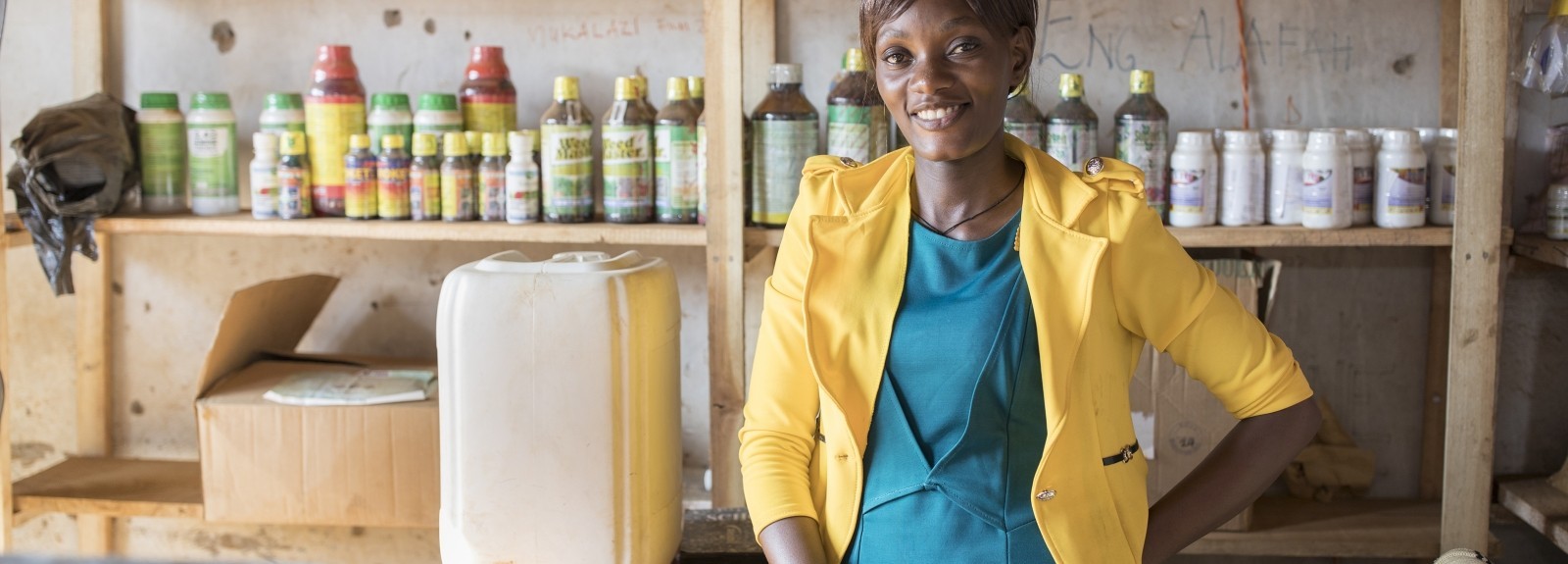Reaching millions of smallholder farmers in remote areas with the agricultural inputs and technical assistance required to improve crop production and livelihoods remains a challenge for private sector firms and development agencies. Lutheran World Relief recognizes the critical role that local agro-input dealers can play to resolve the “last mile” of seed systems. However, given low profitability, the business incentive to supply to remote areas is preventing seed access to farmers at scale.
Village Enterprise Agents (VEAs) can fill this market gap and provide employment opportunities in rural areas, especially for youth, if they have diversified incomes sources within the market system. Lutheran World Relief has learned over years of working with private and public sector agriculture extension agents in Uganda, Nepal, Niger and elsewhere that development actors benefit from focusing their role on increasing VEAs business efficiency and profitability. With VEAs unable to earn a reasonable income through input sales alone, VEAs must realize sufficient profitability to continue as critical agricultural input links for remote farmers in a rural market system instead of shifting to other off-farm income generating activities.
Learnings on Village Enterprise Agents and Profitability
In Lutheran World Relief’s Youth Seed Sustainable Enterprises for Equitable Development (SEED) project in Uganda, we piloted a market systems model to work with 40 youth VEAs and reach 12,000 farmers with high-quality inputs, including improved seed, fertilizer and equipment, along with extension service advice. Our project supported the formation of a VEA Association whose role was to compile orders of seed by variety, along with other inputs, and submit these to a network of large input dealers ahead of the cultivation season. With capacity strengthening and technical assistance from large input dealers, project staff and government staff, VEAs could provide technical support and timely answers to farmer’s questions.
As we monitored the progress of the SEED project, Lutheran World Relief found that VEAs were earning far less than expected, with the highest net profit reaching one third of the anticipated monthly sum. In Uganda, one VEA with an annual turnover of USD $27,000 made a profit of just USD $1,456. However, when interviewed, VEAs found this profit margin acceptable because farming, not running a local agro-input shop, was their core business. As we evaluated outcomes and adjusted activities to solve this profit problem, Lutheran World Relief learned key takeaways that can apply to youth VEA and agricultural input projects:
-
A youth VEA’s economic success depends on how well they understand the input products they sell, their business costs and their potential net profit margins.
-
Selecting entrepreneurial youth to serve as VEAs who have a vision and passion for the sector, coupled with consistent project support, will facilitate success.
-
For youth starting up as VEAs, diversified sources of income should be identified (e.g. farming), as it is challenging to maintain their business beyond a two-year period from input sales alone given low profitability.
-
VEAs and other local agricultural input dealers should strive for a four-fold increase of input sales, while planning for input seasonality, in order to repay loans and make a net profit
-
When there is greater competition between input dealers, VEAs can attract a higher number of farmer clients when they offer technical advice. That said, advice is not enough on its own to make a reliable profit as many farmers believe the government should provide agriculture extension services and are unwilling to pay separately for those services, especially from youth VEAs. Farmers often perceive greater credibility in VEAs who have a strong relationship with a government agriculture extension officer or a private sector input supplier
-
Larger input dealers and seed suppliers need incentives to take on more risk. Currently, most larger input dealers offer technical assistance to easy-to-reach, low-risk farmer clients at a level that does not encroach on their bottom line. This model keeps remote farmers out of the market, placing all risk associated with reaching these farmers on the VEAs.
The role of VEAs within the agricultural food system should not be understated. Strengthening the capacity of local market actors who are trusted to provide accurate data to farmers, especially during COVID-19, is essential. Lutheran World Relief continues to test equitable models of engagement that aim for greater shared profit and risk between VEAs and larger input dealers or seed companies. When VEAs earn a reliable profit, they play a key role in rural market inclusivity, sustainability and potential for agricultural growth.



